Chinese Steel Price hit 3-year low, iron ore falls below $100 due to weak demand
Chinese Steel Price hit 3-year low, iron ore falls below $100 due to weak demand
Chinese Steel Price hit 3-year low, iron ore falls below $100 due to weak demand
Spot price of 20mm HRB400 rebar - used to reinforce concrete for buildings and infrastructure - fell to 3,510 yuan ($507.80) a ton on the Shanghai exchange yesterday. Thursday (May 25), data from consulting firm Mysteel showed.
That is the lowest level since April 2020, when the COVID-19 pandemic began in China - restricting most industrial activity.
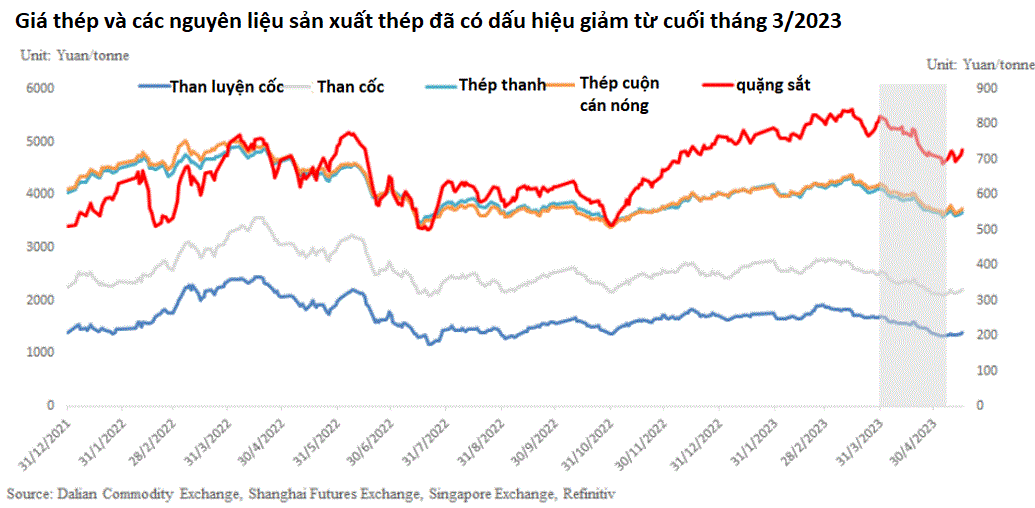 Iron ore prices in China last week also fell below $ 100 on Thursday (May 25) due to concerns about demand for this material when steel consumption is stagnant.
Iron ore prices in China last week also fell below $ 100 on Thursday (May 25) due to concerns about demand for this material when steel consumption is stagnant.
September iron ore futures on China's Dalian Commodity Exchange ended May 25 at 682.50 yuan ($98.74) per ton, while iron ore content 62% Fe imports into northern China were at $97.83 per tonne, the lowest since November.
For the whole week, iron ore prices in Dalian fell 3.5%.
Low demand even during the peak construction season - which usually occurs in March and April - has started the decline in the price of this material, as shown by the price of rebar falling by nearly 17% since the end of March. Any recovery in prices as China enters the summer months, if any, will be slow.
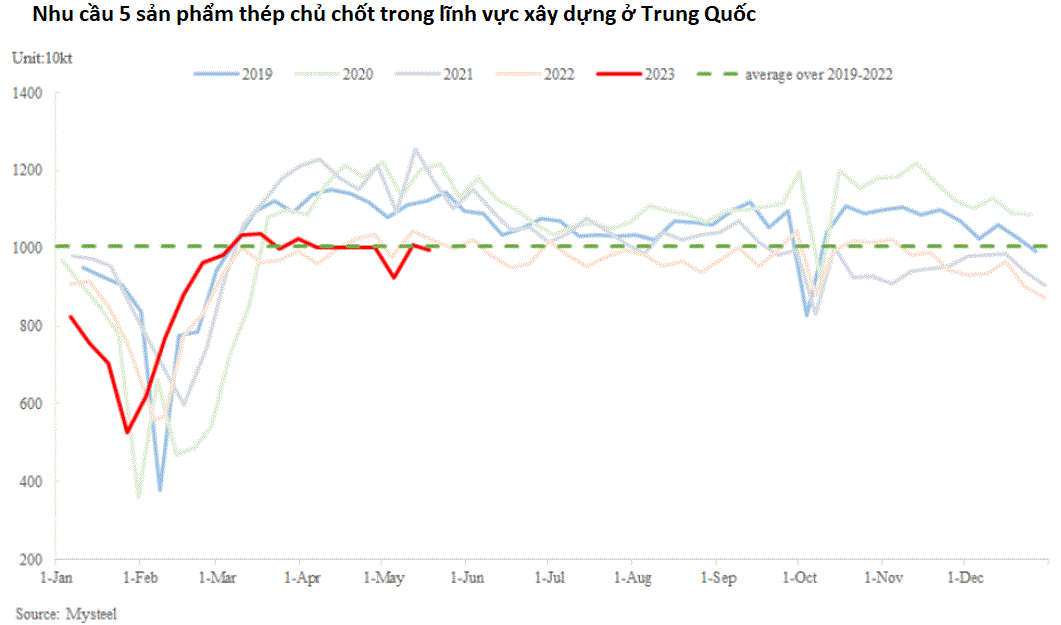 "The situation in China is quite bad. The outlook for steel demand here has deteriorated compared to three months ago," said Takahiro Mori, executive vice president of Japanese steel giant Nippon Steel Corp.
"The situation in China is quite bad. The outlook for steel demand here has deteriorated compared to three months ago," said Takahiro Mori, executive vice president of Japanese steel giant Nippon Steel Corp.
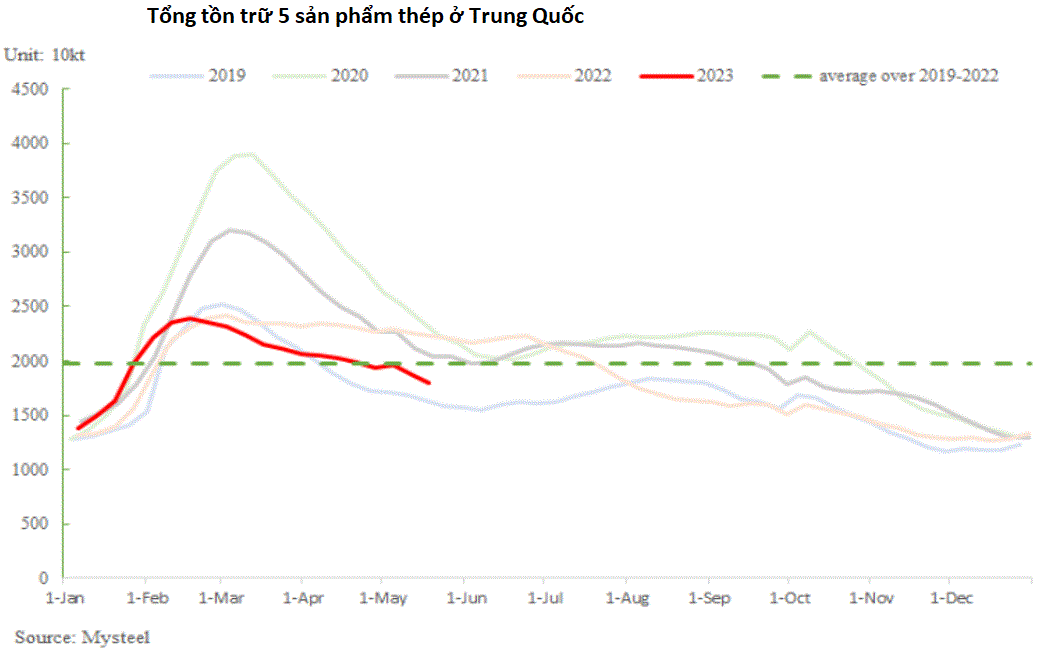 Real estate and infrastructure account for about 60% of demand in the steel sector of the world's largest consumer market, but stimulus programs for infrastructure have slowed and the real estate market has increased. sluggish growth.
Real estate and infrastructure account for about 60% of demand in the steel sector of the world's largest consumer market, but stimulus programs for infrastructure have slowed and the real estate market has increased. sluggish growth.
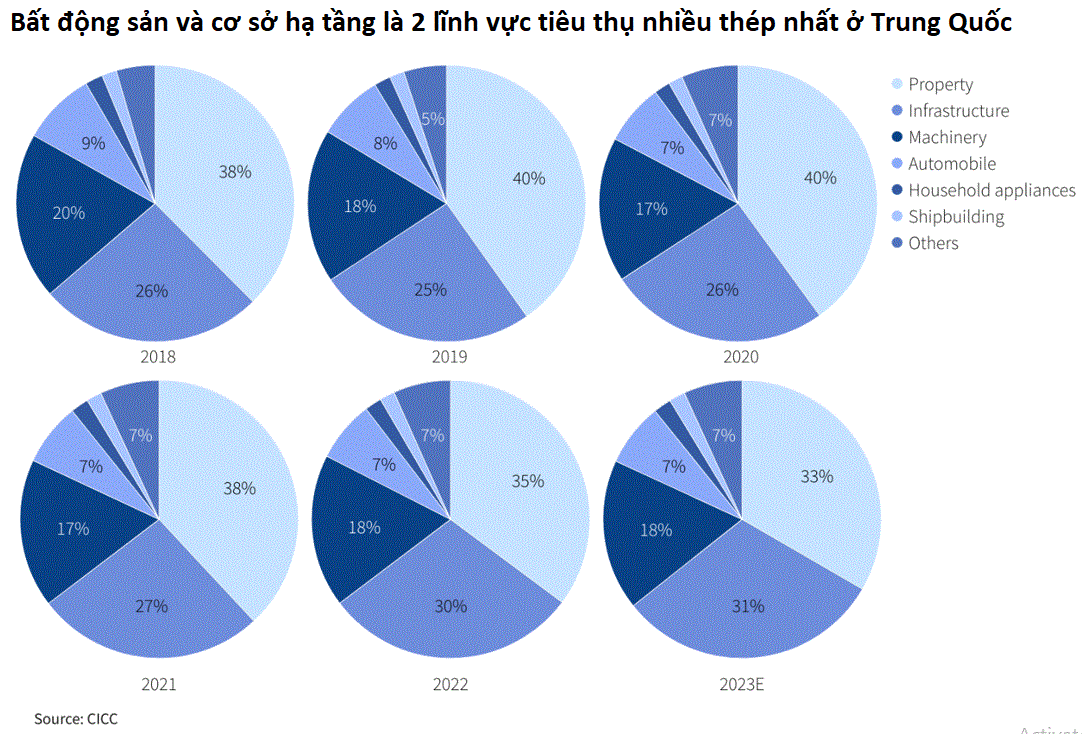 China's steel demand in April fell 3.4% from a year earlier, compared with an increase of 8.7% in March, analysts at Huatai Futures said. They said demand in May fell. So far, it has decreased by 2.5% compared to the same period last year.
China's steel demand in April fell 3.4% from a year earlier, compared with an increase of 8.7% in March, analysts at Huatai Futures said. They said demand in May fell. So far, it has decreased by 2.5% compared to the same period last year.
Additionally, just 53.11% of new special bonds - commonly used to finance infrastructure projects - flowed into the sector in April, down from 56.38% in March and 63 .29% in February, analysts at China Future said.
Data from the National Bureau of Statistics shows that investment in the real estate sector, the sector that uses the most steel, in the first four months of the year fell by 6.2% year-on-year, more serious than the previous year. with a decrease of 5.8% in the period from January to March 2023.
According to NBS, new construction starts (measured by floor area) fell 21.2% in the January-April period from a year earlier, also down from a 19-year decline. 2% of the first 3 months of the year.
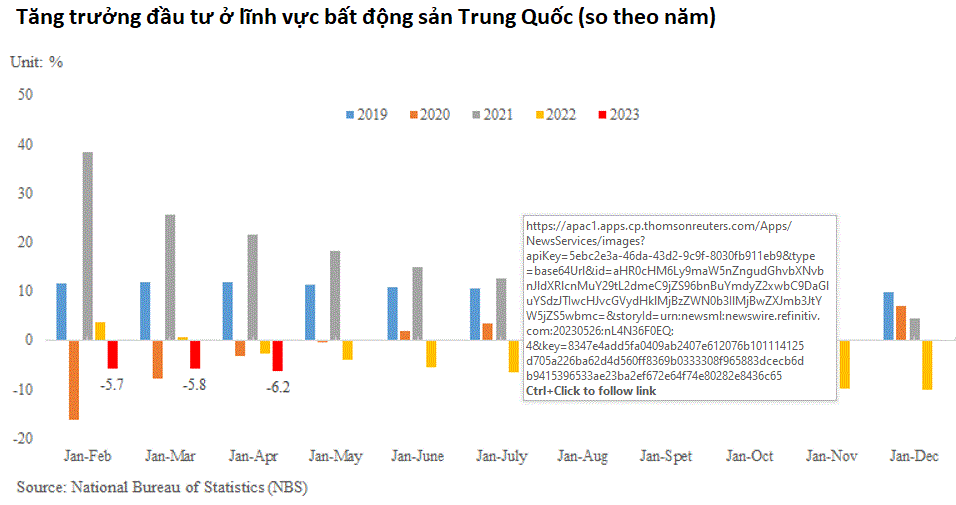 "The impact of the stimulus measures on the real estate sector is not as good as it used to be... Demand (for housing) may fall further," said Sinolink Securities analysts.
"The impact of the stimulus measures on the real estate sector is not as good as it used to be... Demand (for housing) may fall further," said Sinolink Securities analysts.
In addition, the manufacturing sector also unexpectedly contracted last month.
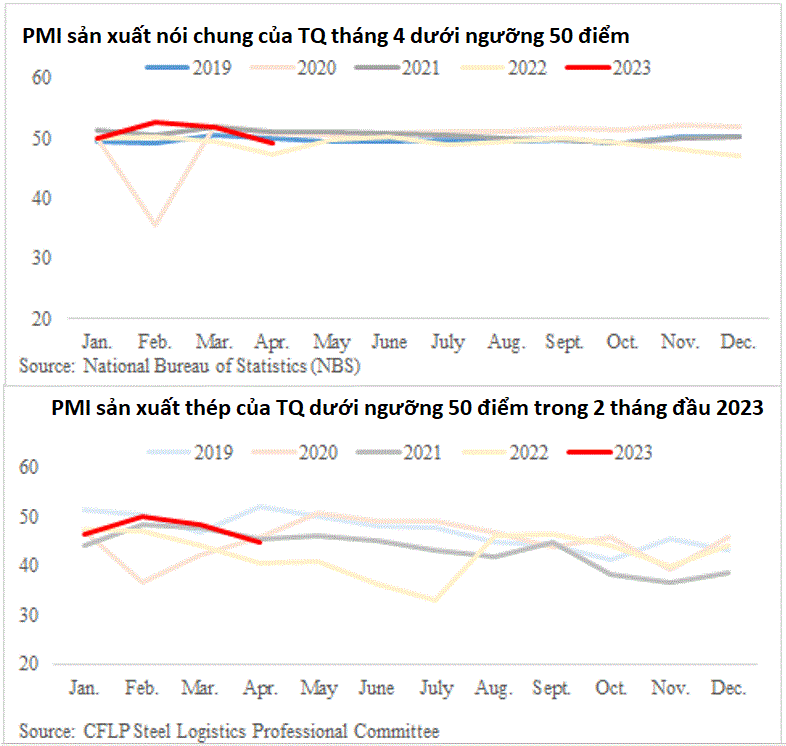 The result of sluggish demand is that pressure on China's steel mills increases ahead of the summer months (June to August), when construction activity typically slows down due to high temperatures and rain. large in the south hinders outdoor activities.
The result of sluggish demand is that pressure on China's steel mills increases ahead of the summer months (June to August), when construction activity typically slows down due to high temperatures and rain. large in the south hinders outdoor activities.
According to Mysteel, only a third of China's mills are now operating profitably, and mining companies' shares globally fell last week as iron ore prices plunged due to weak demand in China. Country.
A steel producer based in eastern China said steel demand will not improve until September, when the weather is more favorable for construction activity and the impact is lagged from a range of measures. Economic stimulus applied since the end of last year to the real estate market.
Nippon Steel vice president Takahiro Mori said the outlook could be even more bleak.
“It (steel demand) is likely to remain weak at least this year or this fiscal year (until March 31, 2024). Therefore, we do not expect the market to improve quickly," Mori said.
China's largest steel producer by market capitalization, Baoshan Iron & Steel, expects the country's 2023 crude steel output to be flat or slightly lower than last year, similar to the majority opinion. analysts and traders.
China's massive steel market awaits official confirmation that Beijing will continue to work on a target starting in 2021 to limit steel output to help the country meet its emissions targets.
Baosteel produced 11.87 million tons of iron and 12.83 million tons of steel in the first quarter of 2023, and is targeting to produce 48.77 million tons of iron and 50.89 million tons of steel this year.
China, the world's largest steel producer, has introduced crude steel production controls by 2021 after pledging to reach peak carbon dioxide emissions by 2030 and achieve carbon neutrality by year 2060.
The country's steel output in 2022 decreased by 1.7% year-on-year to 1.018 billion tons.
Vu Ngoc Diep
Market life – Cafe.vn
That is the lowest level since April 2020, when the COVID-19 pandemic began in China - restricting most industrial activity.
 Iron ore prices in China last week also fell below $ 100 on Thursday (May 25) due to concerns about demand for this material when steel consumption is stagnant.
Iron ore prices in China last week also fell below $ 100 on Thursday (May 25) due to concerns about demand for this material when steel consumption is stagnant.September iron ore futures on China's Dalian Commodity Exchange ended May 25 at 682.50 yuan ($98.74) per ton, while iron ore content 62% Fe imports into northern China were at $97.83 per tonne, the lowest since November.
For the whole week, iron ore prices in Dalian fell 3.5%.
Low demand even during the peak construction season - which usually occurs in March and April - has started the decline in the price of this material, as shown by the price of rebar falling by nearly 17% since the end of March. Any recovery in prices as China enters the summer months, if any, will be slow.
 "The situation in China is quite bad. The outlook for steel demand here has deteriorated compared to three months ago," said Takahiro Mori, executive vice president of Japanese steel giant Nippon Steel Corp.
"The situation in China is quite bad. The outlook for steel demand here has deteriorated compared to three months ago," said Takahiro Mori, executive vice president of Japanese steel giant Nippon Steel Corp. Real estate and infrastructure account for about 60% of demand in the steel sector of the world's largest consumer market, but stimulus programs for infrastructure have slowed and the real estate market has increased. sluggish growth.
Real estate and infrastructure account for about 60% of demand in the steel sector of the world's largest consumer market, but stimulus programs for infrastructure have slowed and the real estate market has increased. sluggish growth. China's steel demand in April fell 3.4% from a year earlier, compared with an increase of 8.7% in March, analysts at Huatai Futures said. They said demand in May fell. So far, it has decreased by 2.5% compared to the same period last year.
China's steel demand in April fell 3.4% from a year earlier, compared with an increase of 8.7% in March, analysts at Huatai Futures said. They said demand in May fell. So far, it has decreased by 2.5% compared to the same period last year.Additionally, just 53.11% of new special bonds - commonly used to finance infrastructure projects - flowed into the sector in April, down from 56.38% in March and 63 .29% in February, analysts at China Future said.
Data from the National Bureau of Statistics shows that investment in the real estate sector, the sector that uses the most steel, in the first four months of the year fell by 6.2% year-on-year, more serious than the previous year. with a decrease of 5.8% in the period from January to March 2023.
According to NBS, new construction starts (measured by floor area) fell 21.2% in the January-April period from a year earlier, also down from a 19-year decline. 2% of the first 3 months of the year.
 "The impact of the stimulus measures on the real estate sector is not as good as it used to be... Demand (for housing) may fall further," said Sinolink Securities analysts.
"The impact of the stimulus measures on the real estate sector is not as good as it used to be... Demand (for housing) may fall further," said Sinolink Securities analysts.In addition, the manufacturing sector also unexpectedly contracted last month.
 The result of sluggish demand is that pressure on China's steel mills increases ahead of the summer months (June to August), when construction activity typically slows down due to high temperatures and rain. large in the south hinders outdoor activities.
The result of sluggish demand is that pressure on China's steel mills increases ahead of the summer months (June to August), when construction activity typically slows down due to high temperatures and rain. large in the south hinders outdoor activities.According to Mysteel, only a third of China's mills are now operating profitably, and mining companies' shares globally fell last week as iron ore prices plunged due to weak demand in China. Country.
A steel producer based in eastern China said steel demand will not improve until September, when the weather is more favorable for construction activity and the impact is lagged from a range of measures. Economic stimulus applied since the end of last year to the real estate market.
Nippon Steel vice president Takahiro Mori said the outlook could be even more bleak.
“It (steel demand) is likely to remain weak at least this year or this fiscal year (until March 31, 2024). Therefore, we do not expect the market to improve quickly," Mori said.
China's largest steel producer by market capitalization, Baoshan Iron & Steel, expects the country's 2023 crude steel output to be flat or slightly lower than last year, similar to the majority opinion. analysts and traders.
China's massive steel market awaits official confirmation that Beijing will continue to work on a target starting in 2021 to limit steel output to help the country meet its emissions targets.
Baosteel produced 11.87 million tons of iron and 12.83 million tons of steel in the first quarter of 2023, and is targeting to produce 48.77 million tons of iron and 50.89 million tons of steel this year.
China, the world's largest steel producer, has introduced crude steel production controls by 2021 after pledging to reach peak carbon dioxide emissions by 2030 and achieve carbon neutrality by year 2060.
The country's steel output in 2022 decreased by 1.7% year-on-year to 1.018 billion tons.
Vu Ngoc Diep
Market life – Cafe.vn

